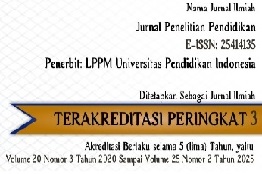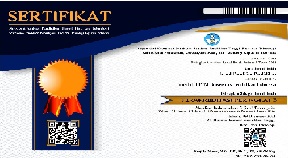Game Simulasi Manajemen Produksi Game Dengan Metode Agile Development
Abstract
Abstrak
Industri game berkembang sangat pesat pada akhir 2010 hingga 2019. Di Indonesia sendiri, pada tahun 2017 industri game Indonesia memiliki nilai pasar sebesar $879 milyar dan diprediksikan akan terus berkembang setiap tahunnya. Namun dari fenomena yang terjadi pada industri game didalam maupun diluar negeri menunjukan indikasi kurangnya pengetahuan dan pemahaman tentang metode pengelolaan pengembangan game yang mengakibatkan gagal produksi, sehingga dapat menghambat perkembangan dan penyerapan ekonomi kreatif, khususnya pada sektor industri game di Indonesia. Penelitian ini bertujuan untuk memberikan pengalaman dan edukasi tentang metode manajemen produksi game kepada pengembang game pemula melalui game simulasi, agar gagal produksi dapat dihindari. Metode penelitian ini menggunakan metode kualitatif dan pendekatan edukasi first principles of instruction oleh Merrill (2002) dengan kerangka berfikir design thinking. Dalam penelitian ini ditemukan bahwa pengembang game pemula kurang memiliki pengalaman dalam mengelola pengembangan game sehingga memiliki resiko kegagalan yang tinggi dalam fase produksi. Hasil penelitian ini menunjukan bahwa game simulasi yang menerapkan metode edukasi Merrill dapat secara efektif memberikan pengalaman dan edukasi pada pengembang game pemula mengenai metode manajemen produksi game, dimana pengembang pemula dapat mengetahui proses-proses yang harus dilakukan pada fase produksi game.
Kata Kunci: Manajemen Produksi, Produksi Game, Game Simulasi, Edukasi.
.
Abstract
1434 / 5000 Translation results The game industry grew very rapidly from the end of 2010 to 2019. In Indonesia alone, in 2017 the Indonesian game industry had a market value of $879 billion and is predicted to continue to grow every year. However, the phenomena that occur in the game industry at home and abroad show indications of a lack of knowledge and understanding of game development management methods that result in production failure, so that it can hinder the development and absorption of the creative economy, especially in the game industry sector in Indonesia. This study aims to provide experience and education about game production management methods to novice game developers through simulation games, so that production failures can be avoided. This research method uses qualitative methods and the educational approach of first principles of instruction by Merrill (2002) with a design thinking framework. In this study it was found that novice game developers lack experience in managing game development so they have a high risk of failure in the production phase. The results of this study indicate that simulation games that apply Merrill's educational method can effectively provide experience and education to novice game developers regarding game production management methods, where novice developers can find out the processes that must be carried out in the game production phase.
Keywords:. Production Management, Game Production, Simulation Game, Education.
Full Text:
PDF (Bahasa Indonesia)References
Adams, E., & Dormans, J. (2012). Game mechanics: advanced game design. New Riders.
Adrianto. (2016): Perancangan Game Keselamatan Kerja Safety First Di Kilang Minyak. Tesis Program Studi Magister Desain, Institut Teknologi Bandung.
Bates, B. (2004). Game Design Boston: Thompson Course Technology.
Bethke, E. (2003). Game development and production. Wordware Publishing, Inc.
Brathwaite, B., & Schreiber, I. (2009). Challenges for game designers. Boston, Massachusetts: Course Technology/Cengage Learning.
Enah, C., Piper, K., & Moneyham, L. (2015). Qualitative evaluation of the relevance and acceptability of a web-based HIV prevention game for rural adolescents. Journal of pediatric nursing, 30(2), 321-328..
Fabricatore, C. (2007). Gameplay and game mechanics: a key to quality in videogames.
http://www.cs.north-western.edu/~hunicke/MDA.pdf diakses pada 27 Mei 2010, 13:25
Kapur, S. (2015). Adolescence: the stage of transition. Horizons of holistic education, 2, 233-250..
Matthews, Judy & Wrigley, Cara. (2017). Design and Design Thinking in Business and Management Higher Education. Journal of Learning Design. 10. 41. 10.5204/jld.v9i3.294.
Merrill, M. D. (2002). First principles of instruction. Educational technology research and development, 50(3), 43-59.
Miller, C. T. (Ed.). (2008). Games: Purpose and potential in education. Springer Science & Business Media.
Novak, Jeanny. (2012). Game Development Essentials An Introduction 3rd Edition. New York: Delinar Cengage Learning.
Plattner, Hasso. (2010). An Introduction to Design Thinking Process Guide. Stanford: Institute of Design of Stanford
Sayogo, S. (2019): Perancangan Crew Management Simulation Video Game Sebagai Media Pembelajaran Manajemen. Tesis Program Studi Magister Desain, Institut Teknologi Bandung.
Schell, J. (2008). The art of game design. Burlington (MA).
Tjandra, A. M. (2015). Perancangan Simulasi Digital Pengenalan Mitigasi Erupsi Untuk Anak-Anak Menggunakan Head-Mounted Display (HMD). Fakultas Seni dan Desain. Institut Teknologi Bandung. Indonesia.
DOI: https://doi.org/10.17509/jpp.v21i2.37405
Refbacks
- There are currently no refbacks.
Copyright (c) 2021 Jurnal Penelitian Pendidikan


